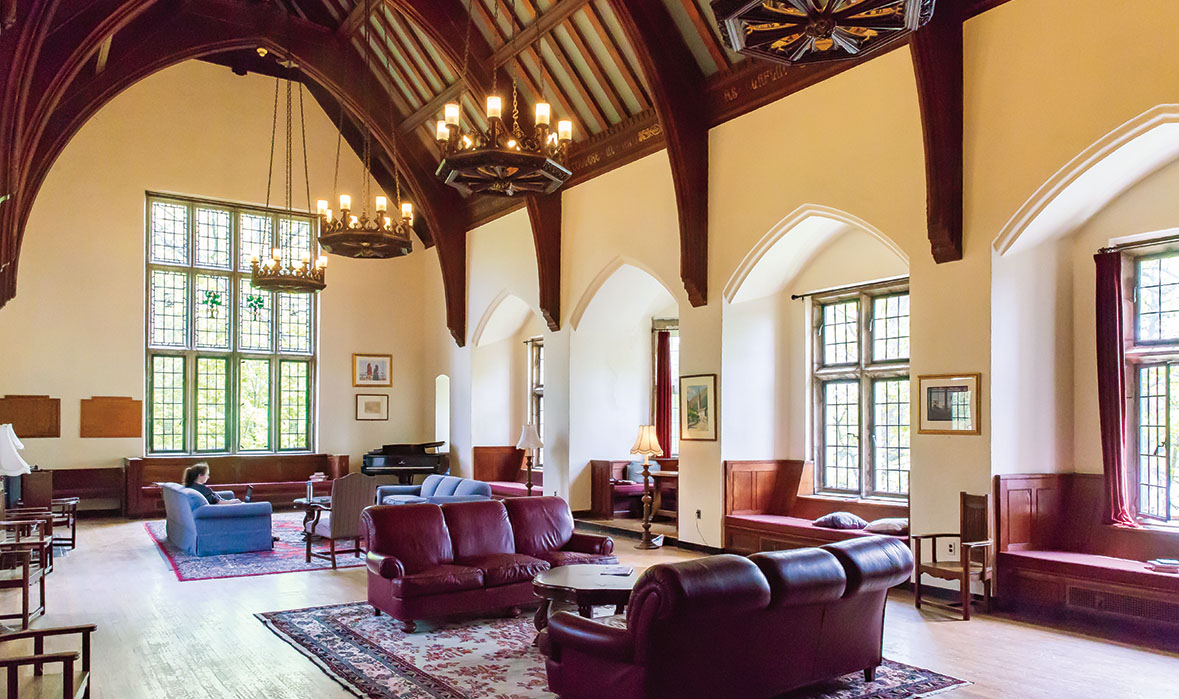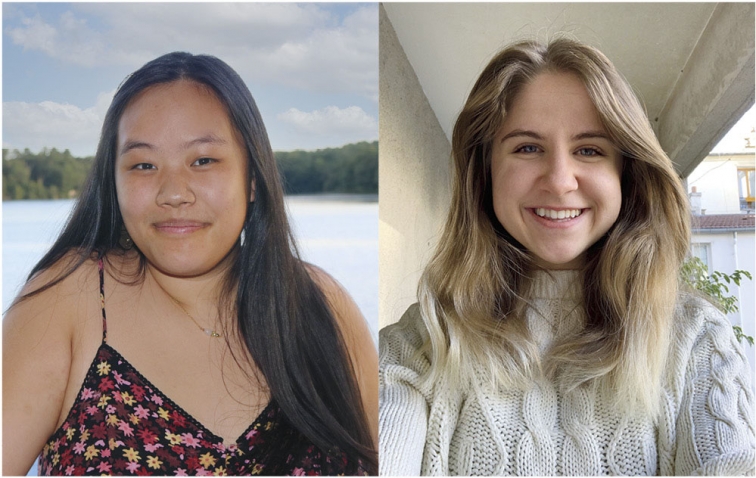Unlike many of her fellow seniors who were studying remotely, Catrina Chen ’21 spent the fall on campus serving as house president of Claflin. Lydia Gramstad ’22, on the other hand, spent the semester in Paris, having decided to go ahead with study abroad. We invited the two of them to give us a glimpse into their very different lives during the pandemic.
Catrina Chen ’21
House President, Claflin
Hometown: Los Gatos, Calif.
Major: International relations with an emphasis on economics
What is it like to be a house president this year?
This position is about advocating for, defending, and celebrating students throughout their time at Wellesley. For the residents of Claflin, I hope that they leave more empowered in their own beliefs and convictions than they came in. I hope they learn to trust in and lean on their community, and find some corner of Wellesley that they know as home.
The essence of the HP job has persisted through COVID but has evolved to fit the new needs of our communities. Instead of trying to maximize the number of students that attend a program, having room capacities set at 10 people has allowed us to redefine success around one-on-one connections. It hasn’t been completely smooth—this year has required more mental and emotional investment from the residential team than ever before. RAs [resident assistants] and HPs are still grappling with how to walk the line between prioritizing the health of the community without policing or judgment. But I think there is an understanding, in Claflin at least, that this endeavor to keep COVID out of our community requires teamwork, and I have been very proud of our residents’ commitment.
What kind of events have you done in your hall?
I like to think that the Claflin community is supported by the RAs and the HP, but that ultimately it is led by its residents. My res team and I look for ways to empower our residents to share their passions with the rest of Claflin by leading their own events, calling on us for logistical and administrative backup when needed. Claflin residents have hosted embroidery events and dance parties during fall break, a socially distanced (and truly scary) haunted house at Halloween, as well as an intricate and thoughtful murder mystery event at our weekly tea. Residents care about their events, about the people who attend, about the fun they have. They go to each other’s programs and support one another. As a result, I have had the honor of attending vibrant and joyful events that are resident-driven and that the five-person res life team could never replicate. My greatest pride is the sense of ownership that Claflin residents feel toward their building and the community inside.

Claflin Hall’s living room
What has been the best part about being on campus? The most challenging part?
This has been a difficult semester on campus. … On top of everything going on outside of Wellesley, students are battling a loneliness and fear unique to the experience of being on a socially distanced college campus. Social interactions are a conscious decision in a way that they have never been. The most challenging thing is resisting the urge to give up and retreat in. To push yourself to be a little awkward and meet new people, and then having to find creative ways to connect that are foreign and uncomfortable—it’s awful, it’s exhausting. I have watched so many people push past the discomfort with bravery and optimism and enjoy the unlikely connections they have found. The best part of being on campus is working with this group of extraordinary first years. I am humbled by their resiliency and resourcefulness in their desire to get to know each other. Above all, I am grateful that they have been able to see this campus. There is nothing quite like Wellesley in the fall, and this year we were blessed with a decently long period of golden trees and red leaves. We got snow in October and a heat wave in November. I see friendships blossom and grow stronger with every season, and I am so glad they get to experience it together.
Lydia Gramstad ’22
Abroad at American University of Paris
Hometown: Birmingham, Ala.
Major: Urban studies

How did you end up in Paris mid-pandemic?
I was supposed to be studying abroad in Copenhagen this semester, but my program was canceled in July, so I scrambled to secure a place at another program. Before I left the States, several people told me it was ridiculous to study abroad during a pandemic, but I honestly felt that it would be safer to live in Europe since the general population is better at complying with preventative measures. I arrived in France in early September, and I will be heading home in mid-December.
What attracted you to American University of Paris?
Part of [the reason] I chose to study at AUP is the courses they offer that are meant to immerse students in the city. I’m taking two art history courses, one of which normally meets almost exclusively in Paris museums. The other had several museum visits scheduled throughout the semester. I’m also taking an immersive English course on Parisian literature that until the lockdown here included biweekly walking tours to parts of the city described in the works we’re reading. It has been truly incredible to discuss the Venus de Milo or the Code of Hammurabi while standing directly in front of them, and it has added so much to my experience of Parisian literature to walk around the places described in them.
How has the pandemic affected your day-to-day life?
For my first several weeks in France, the pandemic had a minimal effect on my life, unless you count basic measures like social distancing and wearing a mask. However, in mid-October, a curfew and university regulations were imposed which kept me homebound more of the time. Then, on Oct. 30, a national confinement, or lockdown, was imposed. Now whenever I want to leave my apartment, I have to fill out an online form stating my reason for going out. Classes are all online for now and the museum visits on video, but I can make an appointment to visit the AUP library to study or check out sources. I am allowed an hour of exercise each day within one kilometer of my apartment, but I can shop for “essential” items with greater freedom. The French have quite a broad concept of what constitutes an “essential” item, so all the food-related shops in my area are open—who knew gourmet chocolate and foie gras were essential?

The Louvre in Paris
Photo by Pascal Le Segretain/Staff/Getty Images
Are the French dealing with COVID-19 differently than Americans?
While I did not witness anything close to complete compliance with mask ordinances in the States, I was expecting it to be better in France. I was not disappointed. Almost everyone consistently wears their mask in public outside of eating or smoking.
On my first full day in Paris, I was riding the Metro with another Wellesley student when a group of young teenagers hopped on next to us. They had pulled their masks down below their noses and mouths, and an older woman began scolding them and telling them to pull their masks up. They apologized to her and initially complied, but pulled their masks down again after a few minutes. The woman sighed and expressed her disappointment, rebuking them again a moment later. I could feel her pain, but I was struck by how foreign this interaction seemed. It would be distinctly out of place in the individualistic society of the States.
I was, however, surprised at how the French were dealing with other measures to prevent the spread of the virus. Paris is a crowded city, so keeping two meters from others can be quite challenging at times and often impossible. Rush hour on the Metro was as crowded as ever, with passengers pressed against each other in a seemingly solid mass. Before they closed due to the confinement, Parisian cafés claimed to have implemented social distancing measures, but groups still congregated around small tables, often with minimal space between them, and customers removed their masks as soon as they were seated.
What are the biggest lessons you’ve learned in Paris? What will you remember about this time?
During my time abroad, I’ve become much more self-reliant. Wellesley is a nice stepping-stone between living at home and the real world, but living on campus with unlimited prepared food still provides a sheltered and comfortable existence. While I’m not facing all the harsh realities of adulthood yet, living in a foreign country in the midst of a pandemic has given me a taste of the potential difficulties in store for me after graduation. I’m glad I’ve had this trial run of semi-independent living.
One of the greatest gifts of this period is the gift of time. Particularly time for reading, reflection, and writing. As much as I may miss my friends and family, the absence of a full social life has allowed me to refocus my life and priorities and to figure out my post-graduation plans. Besides these more significant aspects of my time in Paris, the food, the art, and the city itself have secured a lasting place in my heart.






We ask that those who engage in Wellesley magazine's online community act with honesty, integrity, and respect. (Remember the honor code, alums?) We reserve the right to remove comments by impersonators or comments that are not civil and relevant to the subject at hand. By posting here, you are permitting Wellesley magazine to edit and republish your comment in all media. Please remember that all posts are public.